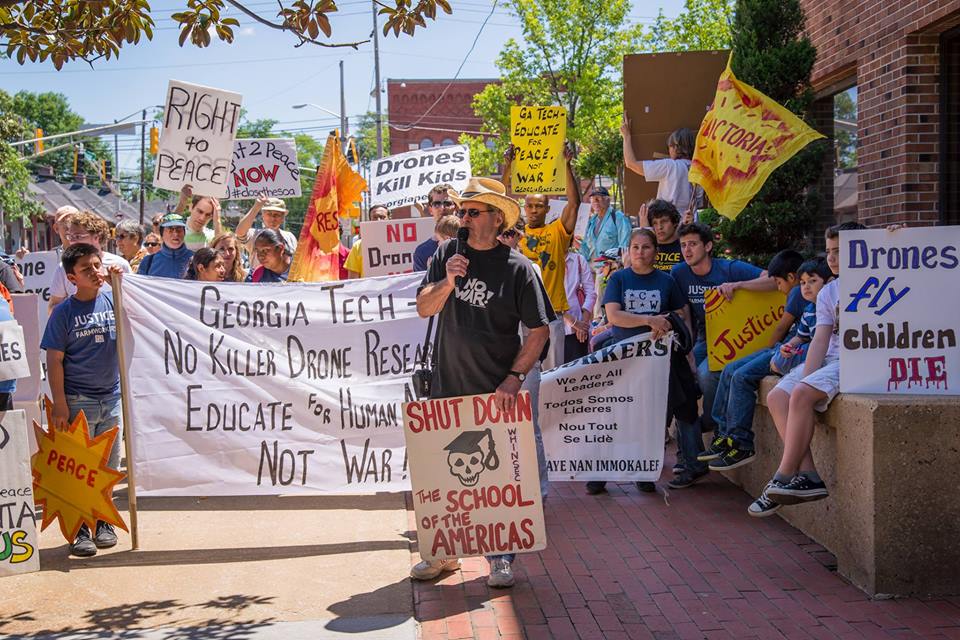Activists Walk Across Georgia in Critique of Drones
(APN) FORT BENNING, Georgia — On May 03, 2014, activists concluded the Georgia Peace and Justice Coalition’s (GPJC) Right to Peace Walk, to bring attention to militarism and drone development in Georgia.
The 120-mile walk had begun eight days earlier at the gates of Ft. Benning. Drones researched and developed at the Georgia Institute of Technology (Georgia Tech) Research Institute are then tested at the Fort Benning Maneuver Battle Lab through a project federally funded by the U.S. Army Threat Systems Management Office.
The walk wrapped up at Georgia Tech on graduation day. Outside of McCamish Pavilion, as graduation attendees navigated campus in their Sunday best and families snapped photos of their recent graduates, a motley crew of about 75 people held a peaceful vigil, donning neon signs with slogans such as “Georgia Tech: Educate for Peace Not War,” “Justicia!,” and “Drones Fly, Children Die.”
“We’ve learned that Georgia Tech is one of the leading research institutions for drone for the use of drone warfare and we’ve decided to connect the dots between this issue and what’s happening around the world,” Kevin Caron, a member of Atlanta’s Drone Task Force, said.
The group raised concerns about drones and human rights abuses, taxpayer-backed research, the ethical implications of drones programmed to kill without human control, and the lack of transparency from the U.S. government about drone kill lists; and called for an end to drone use.
Father Roy Bourgeois, Founder of the School of the Americas Watch (SOA Watch) participated in all eight days of the walk. He emphasized the impact of drones on the lives of victims abroad, as well as the impact upon Georgians.
In addition to testing drones, he mentioned, Ft. Benning houses the Western Hemisphere Institute for Security Cooperation (WHINSEC), formerly known as the School of the Americas, which has trained and continues to train soldiers associated with carrying out some of the worst reported human rights abuses in Latin America.

The school marked the thirteen year anniversary of its renaming this year with a taxpayer backed 28 million dollar renovation. Meanwhile, just miles away, Marshall Middle School and Edgewood Elementary School have closed due to budgetary issues.
“This is not just about our government causing untold suffering and death. It’s being done in our names; it’s with our tax money,” Bourgeois said. “Those drones are consuming billions of dollars in research right here at Georgia Tech and at Ft. Benning. Every dollar among the millions going into drones, going into the SOA, is a theft from our sisters and brothers here at home and in other countries.”
The theft of those abroad, of course, comes in the form of their lives.
While the U.S. government works to keep drone strikes out of the public eye, the Bureau of Investigative Journalism reports that the United States has executed a minimum of 455 drone strikes in Pakistan, Yemen, and Somalia since 2002, resulting in at least 2,640 deaths, not counting other strikes and deaths from covert operations.
Azadeh Shahshahani, Director of the National Security/Immigrants’ Rights Project at the American Civil Liberties Union of Georgia (ACLU) of Georgia, spoke out against the secrecy surrounding these strikes during a rally at the King Center on the final day of the walk.
“The targeted killing program operates without meaningful oversight, outside the executive branch. Essential details about the program remain secret including what criteria are used to put people on CIA and military kill lists or how much evidence is required. The lack of transparency and oversight of the targeted killing program allow those that operate the program to operate with unchecked authority and to put the names of citizens and others on kill lists based on secret determination based on secret evidence that the person meets a secret definition of the enemy,” Shahshahani said.
The ACLU has filed three Freedom of Information Act requests for more information about U.S. drone strikes and is involved in litigation challenging a U.S. drone strike that killed three U.S. citizens in Yemen in 2011.
“I think open debate is always healthy and everyone has the right to their opinions. Spreading awareness for a cause is also important, especially for preserving human life,” Zohaib Mian, a research scientist in aerospace systems design lab at Georgia Tech, whose work includes
projects related to development of drones, told Atlanta Progressive News, in expressing his personal opinion.
“I think the development of technology and use of technology are two different issues and should be addressed separately. If you want to change the way technology is being used, then it should be done through policy making and not by stopping technology development. Because stopping technology development is akin to hindering mankind’s progress,” he said.
The GPJC and Drone Task Force organizers say they will continue to work to prevent drone research, development, and deployment.
Organizers said the walk was an excellent opportunity to bring this information to rural Georgians, who are often less exposed to progressive activism.
Another participant in the full walk, Maria Luisa Rosal, Field Organizer with SOA Watch, recalled a young father who pulled over, parked, and approached her with his two year-old son to thank the group for standing up for what they thought was right.
(END/2014)
